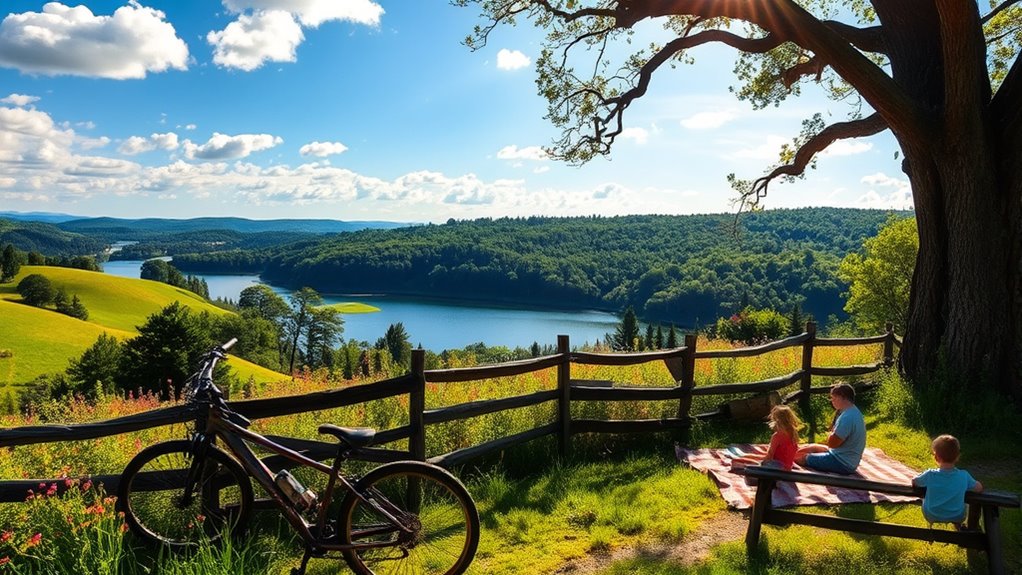For summer 2025, explore incredible green travel destinations like Costa Rica, where eco-lodges and conservation projects thrive. Iceland offers sustainable adventures amidst stunning volcanic landscapes, while Bhutan’s carbon-negative model prioritizes community benefits. New Zealand invites you to enjoy its breathtaking nature and local wines. Don’t miss Lithuania, the European Green Capital, with its green spaces and eco-friendly practices. If you’re curious about even more hidden green gems, there’s plenty to discover!
Key Takeaways
- Costa Rica offers eco-lodges and conservation volunteering opportunities, ensuring a sustainable summer getaway amidst lush nature and renewable energy commitment.
- Iceland’s geothermal power and carbon neutrality goal by 2040 make it an ideal destination for sustainable adventures, featuring unique landscapes and eco-friendly travel options.
- Bhutan emphasizes high-value, low-impact tourism, regulating visitor numbers and using Sustainable Development Fees to support local communities and conservation efforts.
- New Zealand’s stunning national parks and commitment to sustainable practices provide opportunities for eco-friendly wine tours and wildlife experiences.
- Lithuania, designated as the 2025 European Green Capital, features extensive green spaces and eco-friendly transportation, focusing on climate neutrality and local cuisine.
Costa Rica: Pioneering Eco-Friendly Travel
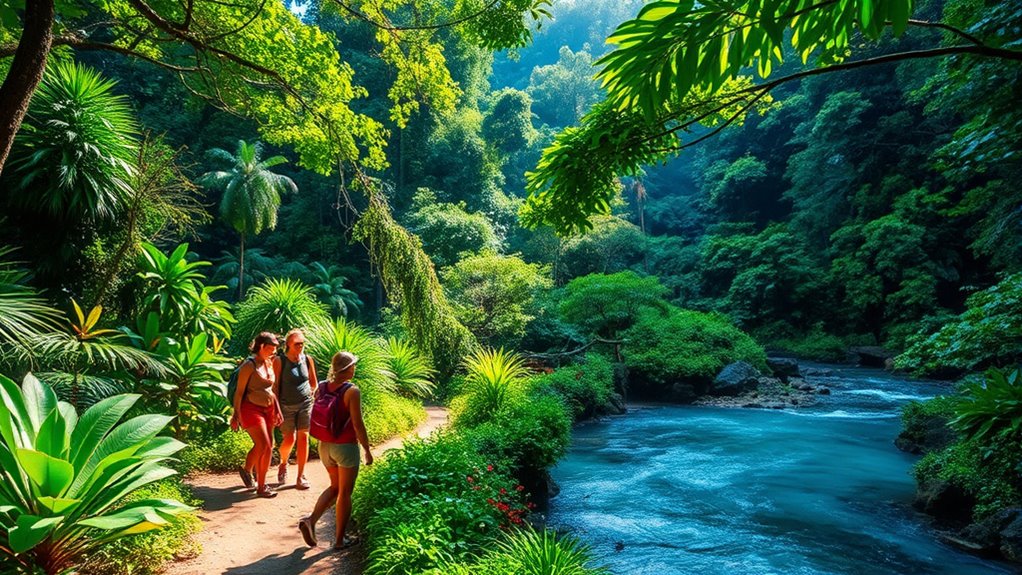
As you explore the vibrant landscapes of Costa Rica, you’ll quickly discover why it stands out as a leader in eco-friendly travel. The country’s diverse natural wonders, from stunning beaches to lush rainforests, invite you to hike and immerse yourself in wildlife. Proper priming ensures that your eco-adventures leave minimal impact on the environment.
Stay in eco-lodges like Lapa Rios Ecolodge, which focus on green energy and local materials. Consider volunteering with projects like the Sea Turtle Conservancy to actively engage in conservation efforts. Additionally, Costa Rica’s commitment to renewable energy not only reduces carbon emissions but also promotes a sustainable tourism model. The nation aims to achieve 100% renewable energy in its electricity generation, showcasing its dedication to environmental sustainability.
Costa Rica’s commitment to renewable energy and sustainable practices enhances your travel experience while supporting the local economy. With improved infrastructure, getting around is easier than ever, making it simple to embrace the eco-conscious lifestyle that defines this beautiful destination.
Iceland: Sustainable Adventures in Geothermal Paradise
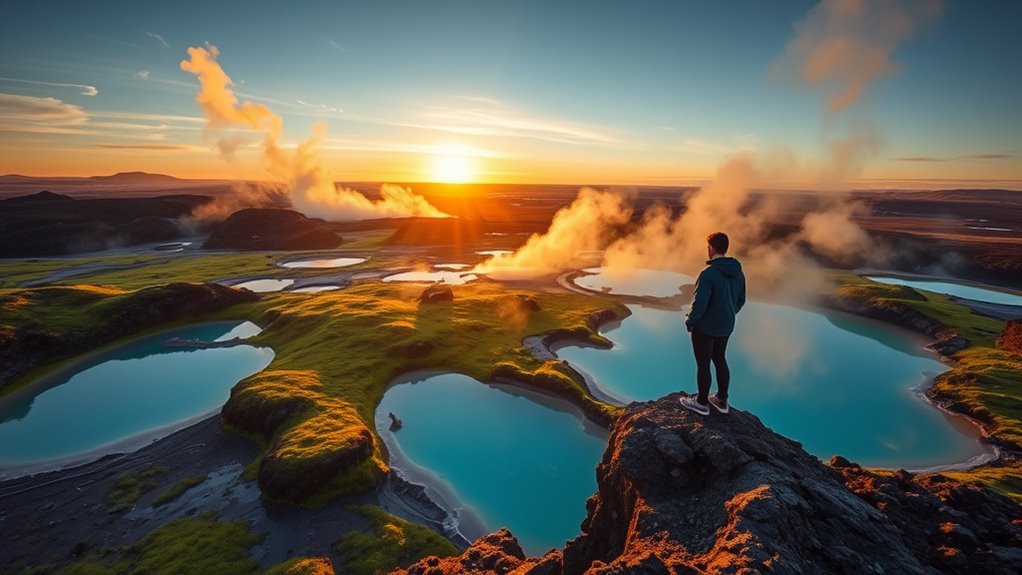
While exploring Iceland, you’ll find yourself immersed in a land where nature and sustainability coexist harmoniously. The country harnesses geothermal energy for nearly all its electricity, complemented by hydroelectric power, creating a clean energy environment. As you traverse the unique volcanic landscape, you’ll encounter breathtaking glaciers and waterfalls, along with geothermal baths like Reykjadalur. Embrace eco-friendly travel by walking or cycling, and consider using electric or hybrid vehicles for getting around. Look for Vakinn-certified accommodations that prioritize sustainable practices. By participating in local conservation efforts, you can help protect Iceland’s diverse wildlife. With a commitment to achieving carbon neutrality by 2040, Iceland sets a benchmark for sustainable adventures, ensuring that its natural wonders endure for generations to come. Additionally, the recent introduction of komugjöld (arrival fees) aims to reinvest tourism revenue into preserving Iceland’s natural resources. In line with global trends, Iceland is increasingly leveraging renewable energy technologies to enhance its environmental sustainability. Including nutrient-dense foods like chia seeds in your diet can further enhance your overall wellness during your travels, as they are rich in fiber and provide essential nutrients to keep you energized.
Bhutan: Experience Carbon-Negative Bliss
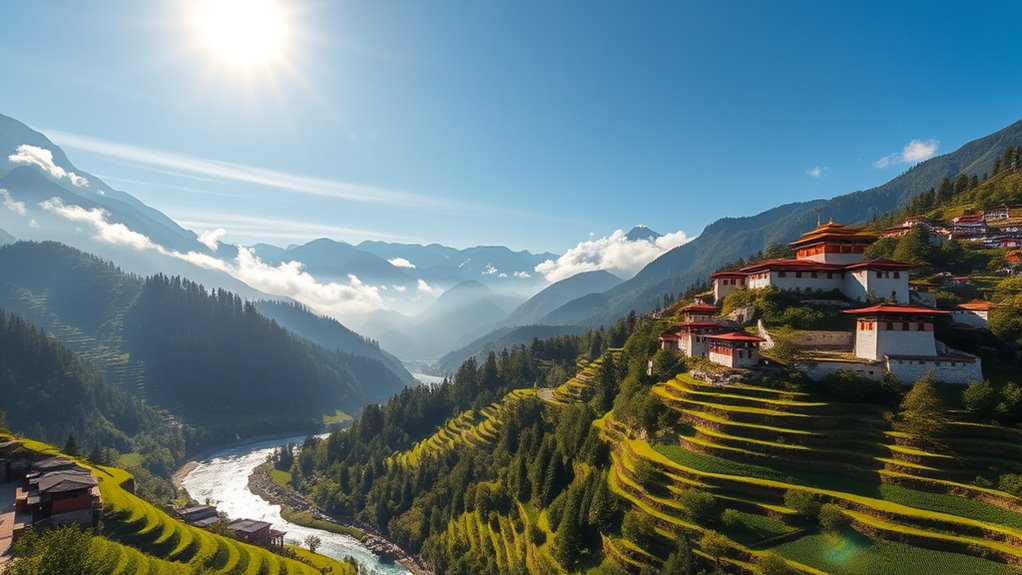
Discover Bhutan, a jewel in the Himalayas where sustainability and culture thrive together, making it an ideal destination for eco-conscious travelers.
Here, you’ll find a high-value, low-impact tourism model that prioritizes community benefits. With a Sustainable Development Fee, your visit supports local welfare and conservation efforts. Visitor numbers kept in check to prevent over-tourism ensures an appreciation of the travel experience. This commitment to sustainability is reflected in their use of necessary cookies to enhance the user experience on their website. Moreover, the country’s dedication to renewable energy sources helps maintain its carbon-negative status. Additionally, Bhutan’s focus on investment strategies ensures that funds are directed towards sustainable projects that benefit both the environment and local communities.
Stay in eco-friendly accommodations that blend luxury with sustainability. Bhutan’s carbon-negative status reflects its commitment to environmental protection, thanks to over 70% forest cover and a focus on renewable energy.
Engage with local traditions as you explore ancient monasteries and partake in vibrant festivals. Respect for customs is essential, and guided experiences ensure you connect meaningfully while preserving the culture.
Experience the bliss of Bhutan—where your journey nurtures both nature and community.
New Zealand: Immersive Nature and Wine Tours
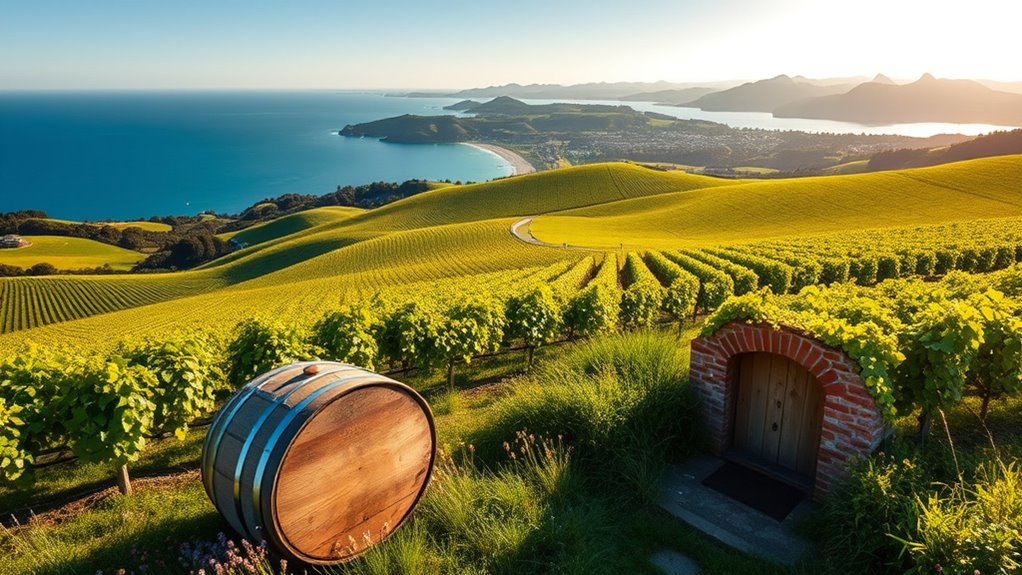
Experience the breathtaking blend of nature and wine in New Zealand, where you’ll find immersive tours that cater to both adventure seekers and wine enthusiasts.
From whale watching in Kaikoura to hiking in stunning national parks like Tongariro and Fiordland, you’ll connect with the country’s diverse wildlife. During your whale watching experience, keep an eye out for sperm whales and dusky dolphins as they are common sights off Kaikoura’s coast.
Explore the Abel Tasman National Park’s beautiful coastal walks while spotting fur seals and unique native species like the kiwi. Along the way, you might also enjoy cheesy polenta, a delicious Italian comfort food perfect for a picnic. You can also savor nutritious dishes like Akara, which reflect the vibrant culinary traditions of the regions you visit. This enchanting destination is celebrated for its expert content that highlights the best of luxury travel.
Indulge your palate in the Marlborough region, famous for its Sauvignon Blanc, or venture to Central Otago for Pinot Noir.
Opt for wine and nature combination tours that offer scenic drives and hiking.
With a commitment to sustainable practices, your journey supports local communities and the environment.
Lithuania: Explore the European Green Capital
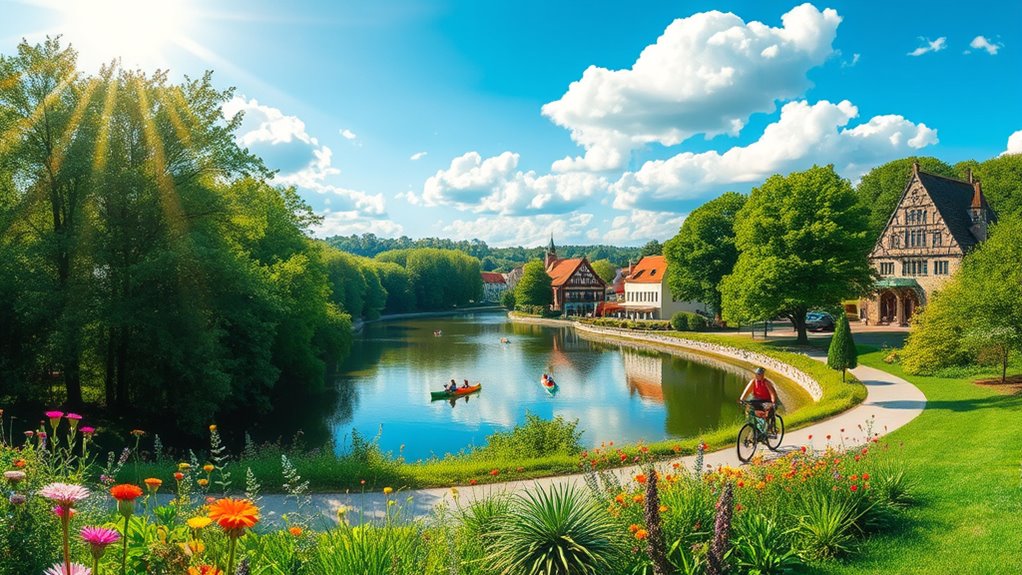
As you wander through Vilnius, the 2025 European Green Capital, you’ll quickly notice the city’s impressive commitment to sustainability and environmental conservation. With over 61% of its territory dedicated to green spaces, Vilnius prioritizes biodiversity and aims to become climate-neutral by 2030. Ranked as the No. 2 destination for travel in 2025, you can explore the city using eco-friendly transportation options like bike-sharing services and efficient public buses. Embracing sustainable habits during your visit will not only enhance your experience but also contribute positively to the environment. Don’t miss the chance to enjoy local cuisine featuring foraged ingredients at Michelin-starred restaurants, including dishes influenced by African culinary traditions. Additionally, there are numerous eco-friendly accommodations available to enhance your stay. Participate in cultural events like the Kaziuko Mugė fair, and take advantage of walking trails and water activities on the Neris River. Vilnius embodies sustainable tourism, ensuring your visit supports both the environment and the vibrant local community.
Emerging Alternatives: Discovering Hidden Green Gems
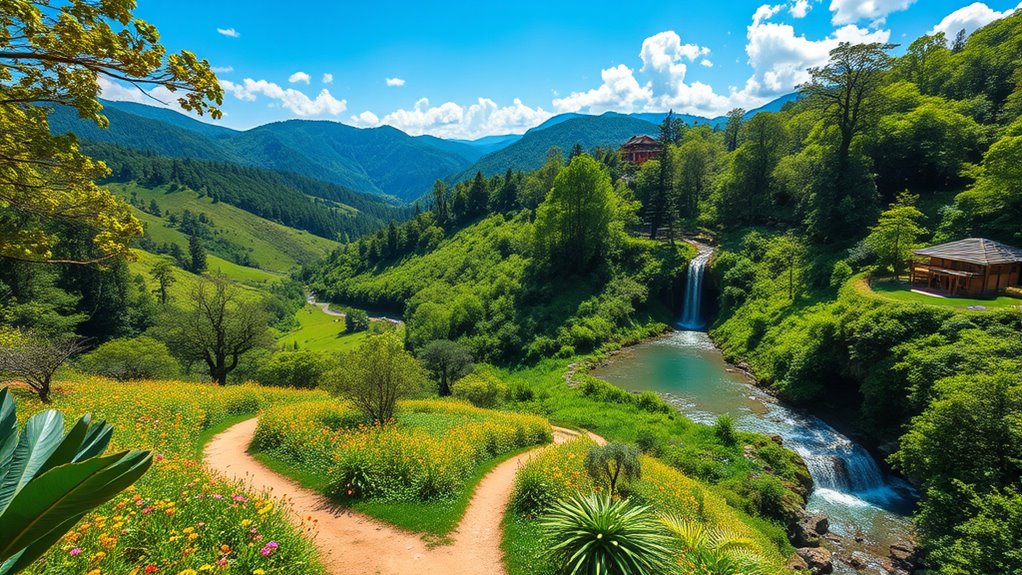
While many travelers flock to well-trodden destinations, an array of hidden green gems awaits those eager to embrace sustainable tourism. Consider exploring Raja Ampat in Indonesia, where vibrant marine life thrives, or the Faroe Islands, offering dramatic landscapes without the crowds. Comporta, Portugal, boasts pristine beaches and a relaxed atmosphere, perfect for unwinding. For a taste of the Himalayas, Ladakh, India, features breathtaking scenery and rich cultural heritage. If you’re seeking alternatives to popular spots, Milos in Greece mirrors Santorini’s charm with fewer visitors. Annecy, France, presents a serene escape akin to Venice. With these unique locations, you can enjoy sustainable travel while discovering the beauty of lesser-known destinations, especially as sustainable travel is increasingly emphasized across Europe.
Frequently Asked Questions
What Are the Best Eco-Friendly Travel Tips for Beginners?
If you’re new to eco-friendly travel, start by researching sustainable destinations and accommodations.
Choose places with eco-certifications and support local businesses.
Pack lightly, using reusable products to minimize waste.
Opt for public transport or carbon-neutral options to reduce your footprint.
Engage in nature-based activities and respect local cultures.
How Can I Offset My Carbon Footprint While Traveling?
You’re planning a trip to save the planet, right? Ironically, your carbon footprint might say otherwise.
To offset it, you can purchase carbon offsets from certified programs, supporting projects that reduce emissions. Calculate your travel emissions using online calculators, then choose the right offset for your journey.
You might also consider eco-friendly transportation options like trains or bikes. Every little step you take helps balance out those pesky emissions while you enjoy your travels!
What Are the Top Sustainable Travel Apps Available?
When you’re looking for top sustainable travel apps, you’ve got some great options.
GreenTrip helps you find low-carbon transportation, while EcoBnb lets you book eco-friendly accommodations.
For tracking your carbon footprint, FlyGRN is a solid choice.
If you want to connect with like-minded travelers, EcoExplorer can enhance your journey.
With these apps, you’ll make eco-conscious decisions that align with your values, ensuring your travels are both enjoyable and sustainable.
Are There Volunteer Opportunities in Eco-Tourism Projects?
Yes, there are plenty of volunteer opportunities in eco-tourism projects.
You can participate in programs focusing on wildlife conservation, community support, and environmental restoration.
For instance, you might join efforts in turtle conservation in Costa Rica or engage in coral monitoring at Australia’s Great Barrier Reef.
These experiences not only allow you to make a positive impact but also immerse you in the local culture and natural beauty of your destination.
How to Choose Responsible Tour Operators for Green Travel?
When choosing responsible tour operators for green travel, start by looking for certifications from recognized bodies like the GSTC.
Check if they engage with local communities and support family-owned accommodations.
Focus on operators that practice environmental sustainability, such as minimizing waste and promoting eco-friendly activities.
Ensure they’ve transparent policies and demonstrate accountability.
Prioritize operators that use local guides and contribute to conservation efforts, making your travel experience both responsible and enriching.
Conclusion
As you embark on your green travel journey in the summer of 2025, imagine dancing with nature in the lush landscapes of Costa Rica or soaking in Iceland’s geothermal wonders. Picture yourself wandering through Bhutan’s serene beauty, sipping wine amidst New Zealand’s vibrant vineyards, or uncovering Lithuania’s eco-friendly charm. Each destination whispers tales of sustainability, inviting you to tread lightly and leave only footprints, ensuring a brighter tomorrow for our planet’s enchanting treasures.
